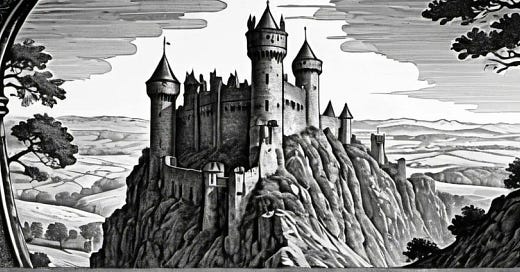For God's sake, let us sit upon the ground
And tell sad stories of the death of kings;
How some have been deposed; some slain in war,
Some haunted by the ghosts they have deposed;
Some poison’d by their wives: some sleeping kill’d;
All murder’d: for within the hollow crown
That rounds the mortal temples of a king
Keeps Death his court …
— Shakespeare, Richard II
“Faërie contains many things besides elves and fays, and besides dwarfs, witches, trolls, giants, or dragons; it holds the seas, the sun, the moon, the sky; and the earth, and all things that are in it: tree and bird, water and stone, wine and bread, and ourselves, mortal men, when we are enchanted.”
— J.R.R. Tolkien
This is a fantasy novel, the first book of a trilogy. It’s a story about a family, an empire and a conflict of civilizations, in which the ruling house of a rising imperium grapples with the consequences of its conquest of two neighboring kingdoms — kingdoms that once had a close relationship with the mysterious powers that in our own world we call Faerie.
In my other life as a newspaper columnist I’ve written about what I think makes the fantasy genre such a potent form — the way it blends a form of “historical” fiction in which the ending isn’t predetermined with meditations on the theme of disenchantment, the fraught, always-incomplete transition from ages of myth and magic into modern life.
The Falcon’s Children is my attempt to tell a story that plays around with both of those potencies, with machiavellianism and metaphysics. It is a complete novel but not perhaps, a finished one, since so far it has only been edited by its author; part of the idea of this serializing experiment is to force me to think a bit more about what might perfect it and make it worth pushing ahead with volumes 2 and 3.
What it is emphatically not is an extension of my day job or an attempt to craft an allegory for our times. (There are no stand-ins for Donald Trump or thinly-veiled references to wokeness, I promise). Except insofar as fantasy is inherently a genre for our times — for a secular age in which the supernatural is creeping back in around the edges of our culture, for a rationalist and liberal world that’s shadowed by a sense (a fear? a hope?) that disenchantment might be going in reverse.
The plan is to serialize the story at the rough pace of a chapter a week, with new chapters appearing every Tuesday. Supplementary world-building material, the sort that makes up the appendices of a proper fantasy novel, will appear more intermittently, starting with the inevitable map and with lists of emperors and archangels to come.
The first 12 chapters, about one-third of the book, will be free, as will any and all supplementary material. The rest of the chapters will be paywalled and available for an annual subscription that’s set at roughly the price of a hardcover book. (The monthly subscription is cheaper for now, but once most of the book is online it will be set at the same level as the annual subscription.)
I am also attempting, perhaps over-ambitiously, to record an audio version of each chapter; those will be paywalled except for the Prologue, in which you will be able to hear my dulcet tones for free.
The chapter art is A.I.-generated for now; if the novel attracts a surprisingly-large readership or I end up publishing a bound version I promise I will pay an actual human being to draw illustrations. (The founding subscription option is there if you wish to hasten that eventuality.)
But for now this just a fun experiment amid a hectic, politics-dominated writing life. So all I can definitely promise is the story itself, which has given me great enjoyment to write and I hope will give at least a few others enjoyment in the reading.
— Ross Douthat, on the Feast of the Archangels, September 29, 2024.




